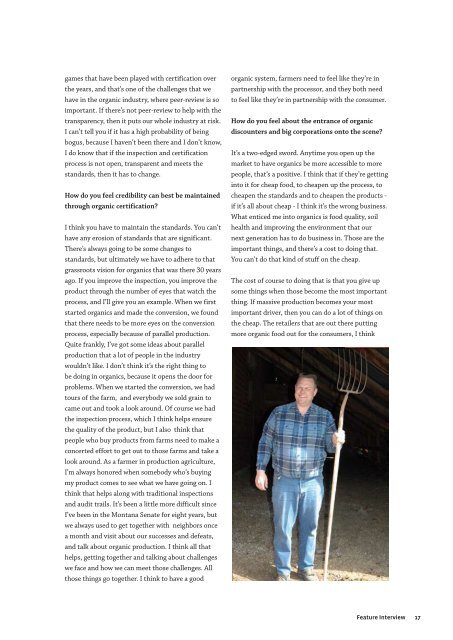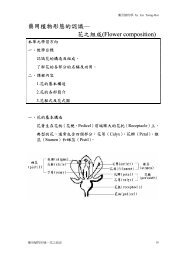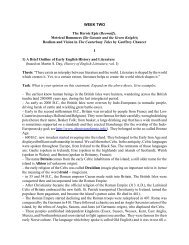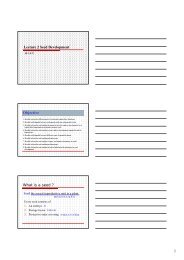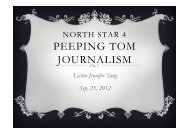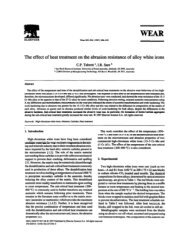Ecology and Farming
Ecology and Farming
Ecology and Farming
Create successful ePaper yourself
Turn your PDF publications into a flip-book with our unique Google optimized e-Paper software.
games that have been played with certification over<br />
the years, <strong>and</strong> that’s one of the challenges that we<br />
have in the organic industry, where peer-review is so<br />
important. If there’s not peer-review to help with the<br />
transparency, then it puts our whole industry at risk.<br />
I can’t tell you if it has a high probability of being<br />
bogus, because I haven’t been there <strong>and</strong> I don’t know,<br />
I do know that if the inspection <strong>and</strong> certification<br />
process is not open, transparent <strong>and</strong> meets the<br />
st<strong>and</strong>ards, then it has to change.<br />
How do you feel credibility can best be maintained<br />
through organic certification?<br />
I think you have to maintain the st<strong>and</strong>ards. You can’t<br />
have any erosion of st<strong>and</strong>ards that are significant.<br />
There’s always going to be some changes to<br />
st<strong>and</strong>ards, but ultimately we have to adhere to that<br />
grassroots vision for organics that was there 30 years<br />
ago. If you improve the inspection, you improve the<br />
product through the number of eyes that watch the<br />
process, <strong>and</strong> I’ll give you an example. When we first<br />
started organics <strong>and</strong> made the conversion, we found<br />
that there needs to be more eyes on the conversion<br />
process, especially because of parallel production.<br />
Quite frankly, I’ve got some ideas about parallel<br />
production that a lot of people in the industry<br />
wouldn’t like. I don’t think it’s the right thing to<br />
be doing in organics, because it opens the door for<br />
problems. When we started the conversion, we had<br />
tours of the farm, <strong>and</strong> everybody we sold grain to<br />
came out <strong>and</strong> took a look around. Of course we had<br />
the inspection process, which I think helps ensure<br />
the quality of the product, but I also think that<br />
people who buy products from farms need to make a<br />
concerted effort to get out to those farms <strong>and</strong> take a<br />
look around. As a farmer in production agriculture,<br />
I’m always honored when somebody who’s buying<br />
my product comes to see what we have going on. I<br />
think that helps along with traditional inspections<br />
<strong>and</strong> audit trails. It’s been a little more difficult since<br />
I’ve been in the Montana Senate for eight years, but<br />
we always used to get together with neighbors once<br />
a month <strong>and</strong> visit about our successes <strong>and</strong> defeats,<br />
<strong>and</strong> talk about organic production. I think all that<br />
helps, getting together <strong>and</strong> talking about challenges<br />
we face <strong>and</strong> how we can meet those challenges. All<br />
those things go together. I think to have a good<br />
organic system, farmers need to feel like they’re in<br />
partnership with the processor, <strong>and</strong> they both need<br />
to feel like they’re in partnership with the consumer.<br />
How do you feel about the entrance of organic<br />
discounters <strong>and</strong> big corporations onto the scene?<br />
It’s a two-edged sword. Anytime you open up the<br />
market to have organics be more accessible to more<br />
people, that’s a positive. I think that if they’re getting<br />
into it for cheap food, to cheapen up the process, to<br />
cheapen the st<strong>and</strong>ards <strong>and</strong> to cheapen the products -<br />
if it’s all about cheap - I think it’s the wrong business.<br />
What enticed me into organics is food quality, soil<br />
health <strong>and</strong> improving the environment that our<br />
next generation has to do business in. Those are the<br />
important things, <strong>and</strong> there’s a cost to doing that.<br />
You can’t do that kind of stuff on the cheap.<br />
The cost of course to doing that is that you give up<br />
some things when those become the most important<br />
thing. If massive production becomes your most<br />
important driver, then you can do a lot of things on<br />
the cheap. The retailers that are out there putting<br />
more organic food out for the consumers, I think<br />
Feature Interview<br />
1


